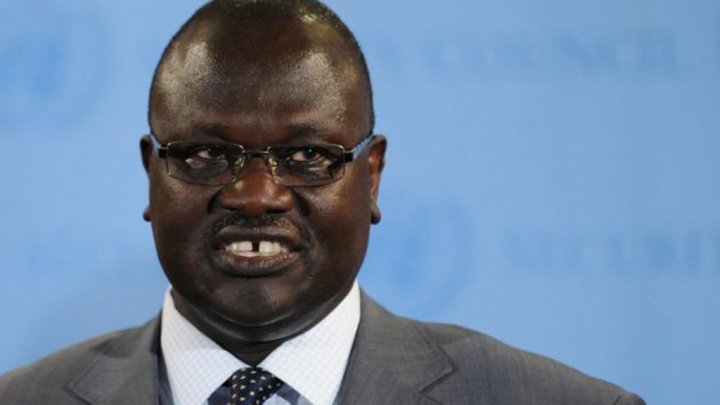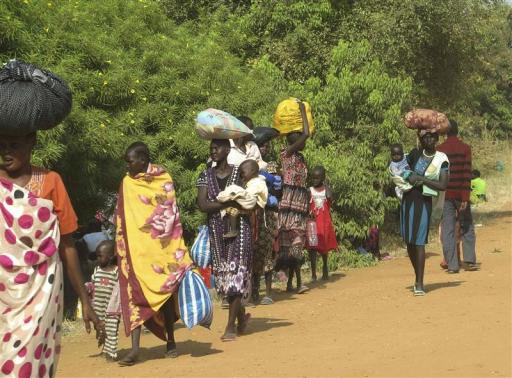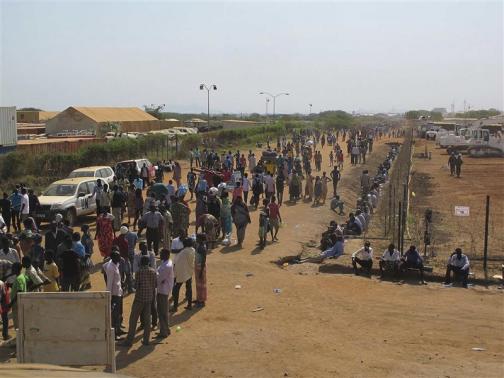www.aljazeerah.info
News, December 2013
Archives
Mission & Name
Conflict Terminology
Editorials
Gaza Holocaust
Gulf War
Isdood
Islam
News
News Photos
Opinion Editorials
US Foreign Policy (Dr. El-Najjar's Articles)
www.aljazeerah.info
|
Editorial Note: The following news reports are summaries from original sources. They may also include corrections of Arabic names and political terminology. Comments are in parentheses. |
400-500 South Sudanese Killed as Fighting Spreads to Near Flashpoint Town of Bor
December 18, 2013
 |
|
| South Sudan's Riek Machar: rebel, statesman, 'coup leader' |
 |
 |
| South Sudanese taking protection at a UN | camp, away from fighting, December 17, 2013 |
South Sudan's Riek Machar: rebel, statesman, 'coup leader'
France 24, December 18, 2013
Vice president, warlord, politician, fighter, collaborator and rebel poster boy who was once married to an attractive British aid-worker, Riek Machar has played a dizzying number of roles in the course of an eventful life.
Now, if the latest allegations by South Sudanese President Salva Kiir are to be believed, the former vice president of the world’s newest nation has earned another title: coup mastermind.
In a televised speech on Monday, issued the morning after gunfire erupted in the South Sudanese capital of Juba, Kiir said government forces had thwarted a coup engineered by his former vice president.
Abandoning his trademark ten-gallon cowboy hat for military fatigues, Kiir delivered a fiery speech, calling Machar a “prophet of doom” who continued "to persistently pursue his actions of the past". Machar himself has denied the allegations. But at 60, he's certainly a man with a past – it just depends on which part of his military and political career his admirers and critics choose to focus on.
Dashing rebel marries beautiful Briton
For seasoned Sudan observers and journalists, Machar remains the fighter who married Emma McCune – a stunningly beautiful British woman who arrived in Africa as an aid-worker, but ended up marrying a rebel commander and getting uncomfortably close to the murkier aspects of a brutal conflict.
At that time, Machar was a leading figure in the SPLM (Sudan People’s Liberation Movement) fight against Khartoum for an independent South Sudan.
The couple were married in 1991, two years before a pregnant McCune was killed in a car accident in Kenya. McCune’s unlikely story was documented in the book, “Emma’s War” by US journalist Deborah Scroggins and it remains a study on the follies of Western idealism directed at Africa.
Machar himself moved on after the death of his British wife. He later married Angelina Teny, a prominent South Sudanese politician.
In 2005, when a peace deal was signed, marking the end of the conflict, the rebel commander traded his combat fatigues for a suit.
When South Sudan gained independence in 2011, he was made vice president, a position he held until President Kiir sacked him – and the entire cabinet – in July 2013. There were widespread rumours of differences between Kiir and Machar as South Sudan moved from the euphoria of independence to the harsh realities of building a nation in an impoverished region awash with arms.
But Machar’s July 2013 dismissal put the split on the international spotlight when the sacked vice president responded by criticising Kiir’s track record and declaring his intention to run for president in the 2015 election.
The latest alleged coup attempt marks a significant development in a dramatic life shaped by the conflict and bloodshed that has haunted this troubled part of Africa.
“He’s obviously a very significant political figure in South Sudan,” said Ahmed Soliman from the London-based Chatham House. “He’s been around a long time and has had significant relationships with leading figures such as [former SPLM leader] John Garang, as well as with Kiir, which has gone through its ups and downs.”
A wanted man
The latest rift between Kiir – who belongs to the majority Dinka ethnic group – and Machar – who hails from the Nuer people – represents a fight for the legacy of the SPLM following the 2005 death of South Sudanese resistance hero, Garang.
“The point is, he [Machar] wants to lead the SPLM. In a sense, he’s fighting for leadership,” said Cedric Barnes, Horn of Africa project director at the International Crisis Group. “The outcome of this is still very much up in the air. It’s still a fluid situation and a very worrying one.”
Machar today is “wanted by the government,” according to senior South Sudanese officials.
On Tuesday, the South Sudanese government announced the arrests of ten people in Juba “in connection with the foiled coup attempt,” according to an official website, which called Machar “the leader” of the plot. Machar himself has denied the allegations and instead accused Kiir of using the latest clashes as a pretext to consolidate his power.
"What took place in Juba was a misunderstanding between presidential guards within their division, it was not a coup attempt," he told the Paris-based Sudan Tribune website on Wednesday, in his first public remarks since the fighting erupted.
"Kiir wanted to use the alleged coup attempt in order to get rid of us," said Machar, whose whereabouts remain unknown.
A falling out and a controversial turn
A strapping, charismatic man with a distinctive gap between his teeth, Machar was born in the Unity State in the upper Nile region. He studied engineering at the University of Khartoum before moving to the UK to earn a PhD at the University of Bradford in the mid-1980s.
By the end of the decade, Machar was back home and fast becoming a senior figure in the SPLM.
Around the time of his marriage to McCune, Machar made one of the most controversial moves in his military career. In 1991, Machar staged a failed coup against Garang – who enjoyed a mythical status in SPLM ranks – and some of Garang’s commanders, including Kiir.
Critics accused the ambitious Nuer commander of receiving covert support from the Khartoum government – a charge he denied.
In 2002, Machar signed an agreement with Garang and went back to the SPLM fold. Following Garang’s death in a helicopter crash in 2005, Machar rose rapidly up the SPLM ranks.
But his 1991 split with Garang continues to haunt him.
In his televised speech on Monday, when Kiir accused Machar of “persistently” pursuing “his actions of the past,” the South Sudanese president was making a deliberate jab at Machar’s reputation as an ambitious climber who can cut deals with the enemy to further his power.
Fears of ethnic tensions
Monday’s clashes, which extended into Tuesday, have sent more than 10,000 people fleeing for the safety of the UN compound in Juba. It has also raised fears of ethnic violence in the oil- rich, but impoverished country.
“There does seem to be some ethnic element involved,” said Soliman before warning that “it’s still too early to determine what has happened in the past 48 hours.”
Barnes, however, cautions against viewing the latest violence as a purely Dinka-Nuer clash. “Many Dinkas are being arrested as well. The Dinkas are not unified and there is no strong solidarity within the SPLM politicians,” said Barnes. “It’s being manipulated by all sides and people are instrumentalising ethnic identity to achieve political ends.”
Whatever the outcome of the latest clashes, South Sudanese citizens and international observers will be closely monitoring what the future has in store for Machar.
South Sudan Fighting Spreads to Near Flashpoint Town
By Andrew Green
JUBA, Wed Dec 18, 2013 8:51am EST
(Reuters) -
Fighting between South Sudanese soldiers spread to the flashpoint town of Bor on Wednesday, raising fears of a broader civil conflict in the two-year-old nation.
An official in Bor, north of Juba, said soldiers attacked each other at two military barracks and one journalist said troops loyal to Vice President Riek Machar now controlled them, suggesting violence was increasingly running along ethnic lines.
Soldiers in the capital Juba have clashed since Sunday, killing up to 500 people, in what President Salva Kiir said was an attempted coup launched by Machar's supporters.
According to the online journal Sudan Tribune, Machar denied any role in the fighting or any coup attempt.
Juba was calm after sporadic overnight gunfire but fighting was also reported to have flared in Torit, east of Juba, adding fresh instability to an already volatile region of Africa.
"The worry is that once this conflict spreads out of Juba to other areas it is in (a) much more ethnic landscape, and then you have the remobilization of the old militias," said one Western diplomat who has long dealt with South Sudan.
The president sacked Machar in July and political tensions have simmered since then in the oil producing nation, which relies on crude exports via a pipeline through Sudan. Till now, fighting had appeared to stay away from the oilfields.
The government said it had arrested 10 people, including seven former ministers, over the "foiled coup" and wanted to question several others, including Machar.
In Bor, where Nuer soldiers loyal to Machar in 1991 massacred hundreds of Dinka, the president's ethnic group, the locals feared the fighting could spill beyond the barracks.
A broader conflict could threaten vital aid and be exploited by neighboring Sudan, which has had persistent rows with Juba over their undefined borders, oil and security. That would further hurt efforts to build a functioning state in the south.
"Last night there was fighting in two military barracks," Hussein Maar, deputy governor of Jonglei state, told Reuters, although he said the town of Bor was calm.
A journalist in Bor told Reuters by telephone that troops led by commander Peter Gadet, a Machar ally, took control of bases that were abandoned by outnumbered Dinka soldiers.
But details were sketchy, and, according to another account, only one base was in the hands of Machar's allies.
REGIONAL IMPACT
The United Nations in South Sudan reported fighting on Wednesday morning in the Bor area, saying on Twitter that more than 1,000 civilians sought refuge in the U.N. compound. It also reported clashes at a military base in Torit, east of Juba.
The diplomat said the expanded fighting was tipping the nation towards an ethnic civil conflict that was "difficult to roll back", saying Kiir had raised the stakes by branding the clashes a coup attempt rather than just infighting in the army.
"It will impact a lot of countries, and they are not beacons of stability," he said of the region around South Sudan. "There will be negative consequences for everybody."
In Juba, traffic returned to the streets and the airport reopened, amid a tense calm in the capital of a nation the size of France with 11 million people but barely any tarmac roads.
The U.S. State Department said it was organizing evacuation flights and Britain said it was evacuating some embassy staff and gathering names of other Britons who wanted to leave. Many aid workers live and work in Juba.
Diplomats said the United Nations had reports of between 400 and 500 people killed and up to 800 wounded in the nation that declared independence in 2011 from Sudan, after decades of civil conflict between what was then north and south Sudan.
"Most people are scared they might be confronted with a mob or see dead bodies," said one aid worker in Juba, adding that the city was calmer on Wednesday morning, after residents awoke to heavy gunfire and artillery blasts on Monday and Tuesday.
Political tensions have been mounting since Machar's dismissal. The former vice president has said he would run for president and has accused Kiir of being dictatorial.
Kiir had said before the clashes that his rivals were reviving rifts that provoked infighting in the 1990s.
He has faced mounting public criticism for doing little to improve life in one of Africa's poorest nations.
"Salva must recognize that the charge of his being 'dictatorial' has taken deep hold, and he must do what is necessary to shed the label as much as possible," South Sudan expert Eric Reeves wrote in an assessment of the violence.
"There are a number of urgent steps he must take to secure the confidence of the international community, and to put the Nuer community at ease in the Juba area and elsewhere."
(Additional reporting by Drazen Jorgic in Nairobi; Writing by Edmund Blair; Editing by Elizabeth Piper and Mike Collett-White)
Fair Use Notice
This site contains copyrighted material the
use of which has not always been specifically authorized by the copyright
owner. We are making such material available in our efforts to advance
understanding of environmental, political, human rights, economic,
democracy, scientific, and social justice issues, etc. We believe this
constitutes a 'fair use' of any such copyrighted material as provided for
in section 107 of the US Copyright Law. In accordance with Title 17 U.S.C.
Section 107, the material on this site is
distributed without profit to those
who have expressed a prior interest in receiving the included information
for research and educational purposes. For more information go to: http://www.law.cornell.edu/uscode/17/107.shtml.
If you wish to use copyrighted material from this site for purposes of
your own that go beyond 'fair use', you must obtain permission from the
copyright owner.
|
|
|
|
||
|
||||||


